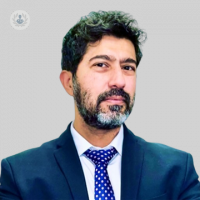Erectile dysfunction: Causes, treatments, and seeking help
Written by:In his latest online article, Professor Rakesh Heer gives us his insights into erectile dysfunction. He talks about the common causes, how to determine if its physical or psychological, medical conditions or lifestyle habits that contribute to erectile dysfunction, treatment options and when to seek help.

What are the common causes of erectile dysfunction, and how can I determine if my ED is related to physical or psychological factors?
It is not unusual for men to occasionally fail to get or keep an erection.
Most commonly, this can be related to tiredness or drinking too much alcohol, which can be easily addressed. In other cases, this may be caused mental or psychological factors, including stress, depression, relationship conflicts or anxiety about performance. In these cases, the issues with erection problems can occur suddenly, or be intermittent and/or situational.
If erectile dysfunction happens occurs often or all the time, typically progressing slowly over time, it may be caused by condition such as high blood pressure, high cholesterol, diabetes, depression or anxiety, heart and vascular disease and hormone problems. We can also see erection problems occur as side effects of some medicines and smoking.
If you have a recurring or persistent problem with erections, it is important to seek advice as it may be a sign of more significant disease. In most cases your doctor can prescribe medicines to help.
What medical conditions or lifestyle habits may contribute to erectile dysfunction, and are there any changes I can make to improve my erectile function?
The key is to lead a healthy life. Lifestyle changes that may be relevant include:
- Stopping smoking
- If overweight, weight loss
- Eating a healthy diet
- Regular exercise
- Where possible, minimising stress and anxiety
- Reducing alcohol intake
What are the available treatment options for erectile dysfunction, and how effective are they in restoring sexual function?
Treatments can be very effective in improving erectile dysfunction.
For many, treatment with tablets is sufficient. These tablets include sildenafil (Viagra), and related drugs tadalafil (Cialis), vardenafil (Levitra) and avanafil (Spedra). Each drug has slightly different actions, and the choice of tablet can be tailored to individual needs.
Other approaches include the use of vacuum pumps, especially in those men where tablets are not suitable. There are drugs that can be delivered into the urethra or injected directly into the penis using small needles.
If there are identifiable causes of erectile dysfunction, then switching medicines and treating high blood pressure, high cholesterol and hormone deficiencies may help. Also, counselling and therapy can help if your erection problems are linked to emotional or mental health problems.
When should I seek medical help for erectile dysfunction, and what can I expect during the evaluation and diagnosis process?
There will be questions about your lifestyle and relationships, and any problems you might be experiencing. There will be a detailed enquiry about the nature of erectile dysfunction, including intimate questions that may feel embarrassing to talk about. These sensitive questions are handled in a professional, discrete and compassionate manner. An examination of your genitals is useful to consider physical causes. Some men may also have urinary symptoms, and a digital examination of your prostate may be advised. Blood tests are typically done to assess hormone function. You can expect a management plan at your first review in most cases.
Professor Rakesh Heer is a highly esteemed urologist with over 25 years of experience. You can schedule an appointment with Professor Heer on his Top Doctors profile.


